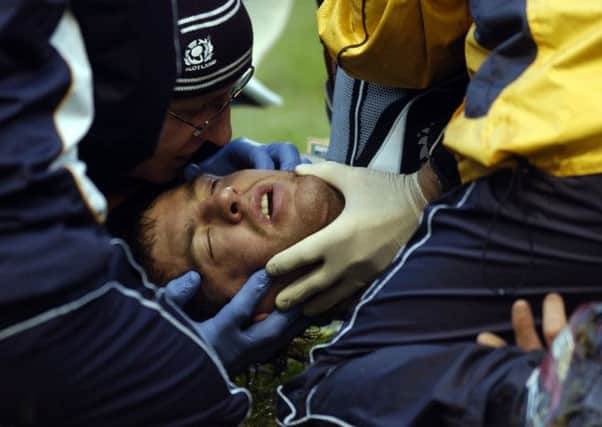Ex-Scotland rugby players to join concussion study


The SRU has asked for former international players to come forward to help with an extensive medical project designed to better understand how concussion can lead to brain conditions such as dementia and Parkinson’s Disease. Last summer The Scotsman revealed growing concerns about concussion in rugby following a revealing interview with former Scotland player Rory Lamont, who claimed that players were ignorant of the dangers and deliberately hiding symptoms. This helped to shine the spotlight on the IRB and its controversial approach to testing, but more significantly added momentum to the work of Dr Willie Stewart, consultant neuropathologist at Glasgow’s Southern General Hospital, and Dr James Robson, the SRU’s Chief Medical Officer and leader in the study of concussion in rugby, in trying to improve the safety of rugby players worldwide.
Following on from links being established in American Football and ice hockey players, researchers at Boston University and the VA Boston Healthcare System this week confirmed that studies of the brain of deceased 29-year-old soccer player Patrick Grange from Albuquerque revealed chronic traumatic encephalopathy (CTE), the degenerative brain disease.
Advertisement
Hide AdAdvertisement
Hide AdHe had died from amyotrophic lateral sclerosis, a disease of the nerves in the brain and spinal cord with which former South Africa scrum-half Joost van der Westhuizen has also been diagnosed.
Grange’s parents said that he had been an avid header of the ball from an early age and loved practising it, and Dr Ann McKee, who carried out the brain examination, diagnosed “extensive frontal lobe damage”. She cautioned against making a definitive link between the brain disease and that damage, but the parents are convinced that his illness stemmed from a series of concussive episodes, and heading, during his football career.
In the world of rugby, Drs Stewart and Robson have persuaded rugby authorities to take concussion more seriously, and their campaign resulted in the publishing last month of a Scottish Government guide for all coaches and teachers and yesterday it was debated in the House of Lords. Now, the duo are moving a step further with the SRU’s backing by launching a nationwide appeal for players to get involved in studies to determine exactly how and where concussion might lead to brain disease and issues in later life.
“What we are looking to find out is if there is evidence that head injuries in rugby union have any long-term health effects,” said Dr Stewart, a former club flanker.
“The importance of us working on this study, particularly with the assistance of Scottish Rugby, cannot be under- estimated. Rugby, globally, has been under the spotlight regarding management of concussion and within the medical world we’re still not able to answer the question definitively ‘Is there a problem?’
“This study, to be conducted through research workers from the University of Glasgow and primarily by interview, will be incredibly powerful for the game of rugby.”
Professor of clinical neuropsychology at the University of Glasgow, Tom McMillan, hailed the move as “one of the first studies of its kind” and it represents a major breakthrough for Scottish sports medicine.
The SRU has worked to tackle the ignorance of concussion with an ‘Are You Ready to Play Rugby’ safety initiative, but there remains concerns that many players, coaches and parents operating from schools and youth to club and pro level still do not fully comprehend the dangers of allowing a player to return to the field after supposedly ‘shaking off’ a head knock.
Advertisement
Hide AdAdvertisement
Hide AdThe SRU reiterated yesterday the catch-all mantra of ‘if in doubt, sit them out’, which applies to coaches, teachers and parents operating at all levels in the game, when it comes to anyone suspected of suffering concussion. It is still not clear what damage can be done, however, with some players suffering several concussive episodes and seeming to continue unaffected while others, as in the case of Irish teenager Ben Robinson, have suffered fatally from as little as two knocks to the head in one game.
That is why more evidence is required and Scotland’s record male cap-holder Chris Paterson has joined Lamont – both having suffered a series of concussions in their careers – in signing up to the studies.
“We have the opportunity here to help the future of the game and players’ welfare,” said Paterson. “I’m a parent and I don’t know if my children will choose to play rugby.
“But I’d like to be able to use my experiences along the way, together with those of other players, to help shape the future and underline that our sport is doing everything it can to lead the way on understanding concussion for future generations of players at all levels of the game.”
Dr Robson added: “Concussion at the moment is the [single] most important healthcare issue in a number of sports. By looking back at our ex-internationalists we hope to learn how we can look forwards.”
Dr Stewart appealed for as many ex-internationalists to come forward as possible by getting in touch with the SRU. He said: “The strength of the information we get from this study and its value to our understanding of head injuries in rugby and how best to manage them are directly related to the number of ex-players we can speak to.”